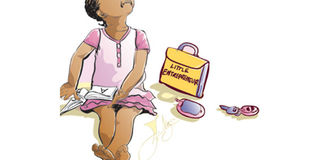Not every young person wants to be employed

Now that I am a parent, I would like to bring up my daughter differently. Even though I want her to make it to university, I also want her to know that some of the world’s most successful entrepreneurs are college drop-outs. ILLUSTRATION | NATION
What you need to know:
- I was supposed to be a well-behaved child who would not embarrass them in front of guests or neighbours. I was also expected to go to school and perform well in class, which meant acing every test to avoid answering tough questions.
- A good job here, just to be clear, was a job where you wore a suit and tie to work, carried a handbag, and dove an ex-Japan Toyota and had chips and soda at a fancy restaurant at least once a week. All in that order.
- So indoctrinated was I in the “Soma kwa bidii utapata kazi nzuri sana,” philosophy, that the idea of being an entrepreneur became synonymous with failure.
Growing up in a typical middle-class Kenyan family in the eighties, there were some dreams that, including Lupita’s, were not valid.
My life’s path was clear to my parents from the second I set eyes on the world.
I was supposed to be a well-behaved child who would not embarrass them in front of guests or neighbours. I was also expected to go to school and perform well in class, which meant acing every test to avoid answering tough questions like:
“Did I take you to school to sleep?”
As if in conspiracy with our single-minded parents and teachers, there was a song in KBC (Then VOK) radio, that went something like this:
“Someni vijanaa,
Muongeze pia bidii,
mwisho wa kusoma,
mtapata kazi nzuri sana”
(Study, young ones,
Study hard,
When you are done studying
You will get very good jobs)
As a child, I was not given options, my only choice was to pass my examinations. My talent did not count, therefore I could not aspire to become the greatest artist that ever lived, or the fastest swimmer in the world.
LOWLY JOB
The next logical step was, as prescribed by the singer Henry Makobi, to get a good job.
A good job here, just to be clear, was a job where you wore a suit and tie to work, carried a handbag, and drove an ex-Japan Toyota and had chips and soda at a fancy restaurant at least once a week. All in that order.
“Who do you want to be when you grow up?” had obvious answers, which we automatically gave, never mind that we did not really know what these professions were about:
“Doctor, lawyer, teacher, accountant, and pilot,” answers that were always met with approving nods from your parents, your parent’s friends, neighbours, the shopkeeper, your pastor, the nanny, even the watchman.
So indoctrinated was I in the “Soma kwa bidii utapata kazi nzuri sana,” philosophy, that the idea of being an entrepreneur became synonymous with failure.
An eccentric auntie (Well, she had two pet dogs that shared her plate of food, and she had quit her high-profile job to start a business that wasn’t doing well, which explained why she was now living with us) once asked me to sell cabbages and carrots for her outside our gate.
“I will give you five shillings for every cabbage or packet of carrots you sell,” she said.
As a ten-year old, I was torn between the thought of the endless supply of mabuyus and ngumus that the extra five bob per sold item would afford me, versus the thought of my classmates seeing me doing such a “lowly” job.
SCHOLAR AND ENTREPRENEUR
The call of mabuyus eventually won, but I hid my face whenever I spotted someone who could know someone who knew me. Needless to say, I ended up with no sales and no lesson learnt.
I think those many years back and ask myself - what if my parents had encouraged me to pursue entrepreneurship as well? What if I had sold the hell out of those cabbages and made enough money to buy mabuyus until I got bloated?
What if that could have been the beginning of my journey as an entrepreneur? What if I had graduated from eating mabuyus to selling mabuyus to my classmates?
My parents, of course, did not admonish me for failing to make any sales, but instead wondered whether my homework was done. And why was I wasting time selling cabbages when I should have been studying, they asked.
Now that I am a parent, I would like to bring up my daughter differently.
Even though I want her to make it to university, I also want her to know that some of the world’s most successful entrepreneurs are college drop-outs, and that she can be whatever she wants to be - that she can have the best of both worlds.





